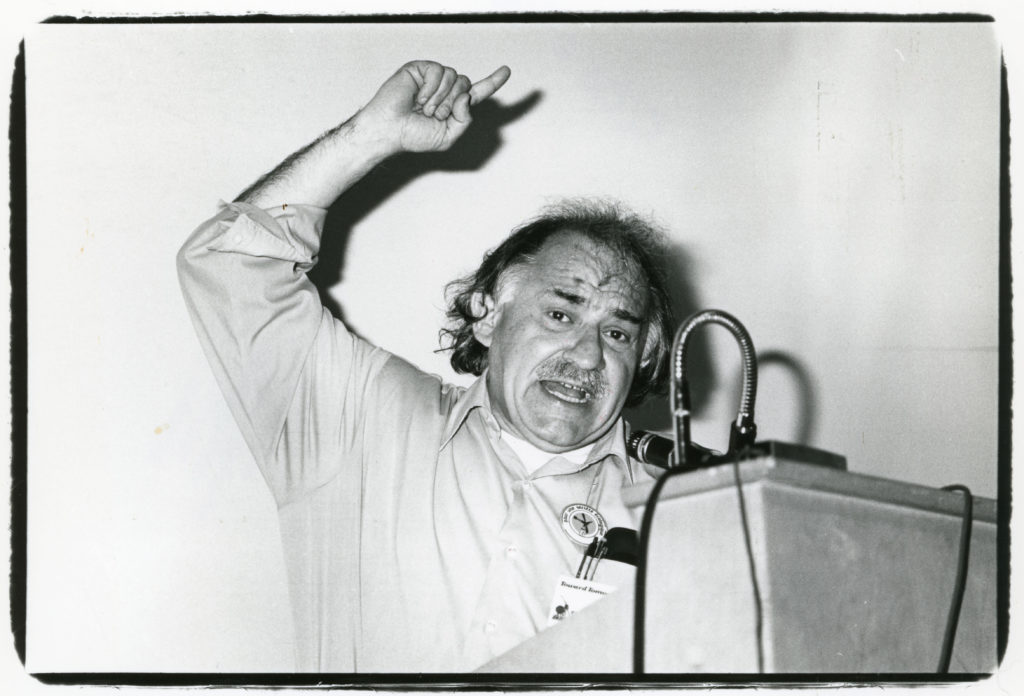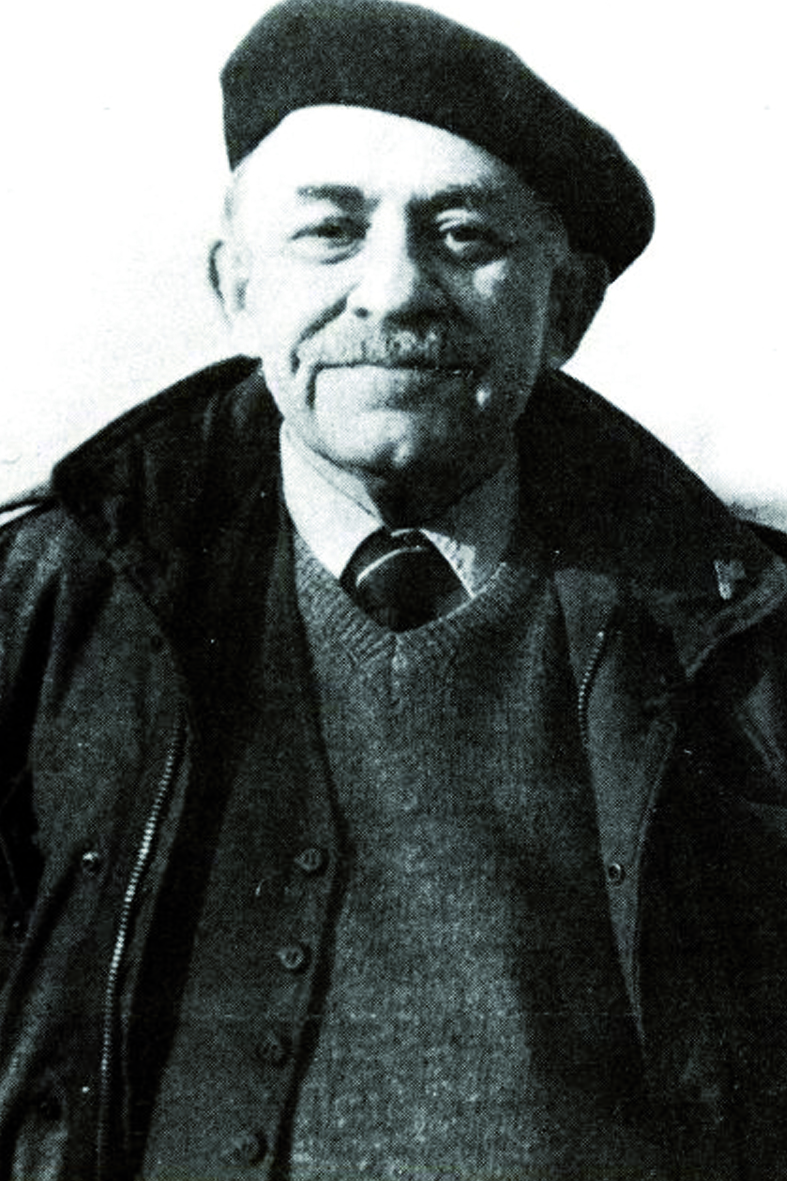Murray Boookchin (14/1/1921 – 30/7/2006) was an American communalist, political philosopher, trade-union organizer and educator. A pioneer in the environmental movement, Bookchin formulated and developed the theory of social ecology and urban planning, within anarchist, libertarian socialist and ecological thought. He was the author of two dozen books covering topics in politics, philosophy, history, urban affairs and social ecology.
Murray Bookchin, over his lengthy period of writing managed to create within social ecology, a discourse that challenged the dominant pre-existing modes of humanity’s role within society. Social ecology offers a political strategy, anthropological and historical investigation whilst also at times criticizing utopian ideas of social order (Tokar et al, 2008). Social ecology is best seen as a complete accumulation of the human endeavour; for one to deal with external determinations within one’s own settings, validified and justified against one’s own level of scrutiny in context of one’s surroundings and relationships to others within the natural environment. At a primary level, social ecology tackles the political, social and cultural roots of modern ecological issues by critiquing traditional environmental policies and practices and encourages activists to uptake radical, community-centered approaches (Bookchin, 2009). The fundamental crux was that ecological issues need to be analyzed and acted upon as social issues rather than the dominant narratives of conventional environmental science (Bookchin, 2009). The holistic nature of such conventional ecological science was deemed to be failing, as is evident today through global warming and climate change and where social ecology implores the analyzation of systemic roots of environmental crisis it also challenges the existing institutions accountable for maintaining the status quo (Bookchin, 2009). This fundamental shift in the approach to dealing with agency within one’s own environment highlights Bookchin’s influences from Hegel (Bookchin, 1995). Bookchin outlined this approach in The Philosophy of Social Ecology: Essays on Dialectical Naturalism, highlighting that the system should be validated against nature itself and not through unjust institutions that are maintaining dominant narratives and controlling discourse (Bookchin, 1995). This is not to suggest that Bookchin was a Hegelian, but his left-wing up bringing will have shaped some of his understanding of the natural order and he himself spoke on occasions of his grounding in traditional Marxism, as well as other left-wing historical writers (Murray Bookchin Explains Anarchism, 2011).
Bookchin’s critical outlook into the deeper intrinsic nature of the evolution of relationships that exist between society and non-human nature was radical. Anarcho-communist and liberal societies for the most part have seen nature and its domination as a sense of achievement within their own propagation (Mazurski, 1991, Koch, 2011). Today the same environmental harm is often viewed as a regrettable but compulsory consequence to the subjective needs of capitalism and expanding civilization. This coupled with the current neoliberal late-stage capitalist approach only increases the social and environmental harm observable in day to day society, both nationally and globally. Bookchin however, in The Ecology of Freedom, (1982) highlights that the domination of nature as he saw it was a myth predominantly perpetuated by social elites within the most primitive and earliest hierarchal societies, to dominate the natural world in attempt to show strength, and that it is not a historical necessity. This reshaping of the traditional understanding of society is important as it no longer justifies rampant expansion or the more grotesque forms of civilization’s expansion such as colonialism and imperialism on the basis of necessity. Bookchin indicates that historical organic societies were based on core principles such as unity-in-diversity, interdependence, usufruct, complementarity and the irreducible principle that society is responsible for meeting its members most basic needs (Bookchin, 1982). A key indication of radical change is Bookchin’s inclusion of ‘complementarity’, meaning that the traditional sense of equals is oppressive of one inequality and that instead, a shift towards creating communities that can compensate for disparities in ability amongst its cohabitants was needed. Bookchin affirmed his rich catalogue of anthropological study by asserting that these radical ideas were not new creations of a utopian dreamer but historically accurate representations of foundationary tenets of a justifiable successful society (Bookchin, 1982). Furthermore, Bookchin indicates that a true liberatory protest movement must include a challenge to hierarchy in general, and not just its hierarchies’ manifestations of oppression such as gender and class inequalities, demonstrating a move away and separation from his childhood traditional Marxist beliefs (Bookchin, 1982, Murray Bookchin Explains Anarchism, 2011).

Bookchin’s obsession into the study of hierarchies and hierarchical domination within the realms of social evolution and humanity’s relationship with nature led to his understanding of the relationship between human consciousness and natural evolution. As previously mentioned, his work on dialectical naturalism featured the study of classic philosophers such as Aristotle and contemporary dialectical philosophers such as Hegel. Bookchin’s ideas of dialectical naturalism are highly complex and are a sharp change away from traditional explanations of dialectics. Bookchin emphasizes the capabilities of humans acting outside of the evolution of social and natural phenomena and upheld human creativity and its uniqueness within the universe, whilst also attributing its inherent and emergence from first nature, meaning the world as it was before human influence and damage to the natural environment (Bookchin, 1995). This view instead, shifts nature away from being a necessity-built robot and places deep emphasis on the view that nature was always striving to achieve its own underlying potential for creativity, freedom and universal consciousness (Bookchin, 1995). This is what grounds Bookchin in such passionate writing, his deep understanding of the fabric of reality and how hierarchical domination distorts natures very own expression of itself. This view sees that the current understanding of human history and the so-called logic of evolution within the social sphere is in conflict with nature itself, such exploitative organisation of infinite chaos only chastises the very essence of life in its own expression (Bookchin, 1995). This lead Bookchin to suggest that nature itself could be studied to form objective principles as to how best organizing social ethics and ideas. Principle such as cohabitation and mutual aid can be viewed within nature (Bookchin, 1995, Kropotkin, 2017).
This in depth look into life, existence, natural dialectics and social ecology accumulated into a political approach from Bookchin, endeavouring to radically alter the hierarchical problems of life by organizing them into libertarian municipalism. Bookchin’s approach to libertarian municipalism is what this study would recommend for a radical overturn of society. The fundamental conflicts between communities and the state that society is constantly experiencing (Cetin, 2020, Jetten,2020) as well as historical examples from ancient Athens to New England are systemic fluctuations, due to the lack of control citizens have over their own political and economic decision making (Bookchin, 1974, Tokar, 2008). Libertarian municipalism would see assemblies being central to the decision-making processes, with representatives in city councils and wider county councils becoming mandated through their own local assemblies and only have the power to carry out the organized wishes of the localized collective assembly (Bookchin, 1974). Importantly, Bookchin’s libertarian municipalism would organise society via confederations with community members working together within confederations to attempt to highlight unjustified current community institutions, constantly attempting to undermine the institutions to advance on inaccuracies of justice via what are known as counterinstitutions and is something as Anarcho-Communists we could draw form (Bookchin, 1992). This mode of political organisation highlights more faith in the citizens themselves and doesn’t place governance in the hands of unjust, top-down hierarchical social institutions, but rather places emphasis on educating the citizens themselves on principles such as freedom, universalism, altruism, cooperation and public service which further empowers all within society to develop their own autonomy within the collective (Bookchin, 1992). The brash, exploitative, narrowly limited scope of the capitalist market would be found unjust and replaced by a moral economy, meaning political and economic relationships would be guided by ethics such as mutualism in a bid for genuine reciprocity (Bookchin, 1986).
Libertarian municipalism creates a political strategy within a wider framework of social ecology’s reconstructive view of nature and humanity’s place within it, as anarchists we can learn from some of the lesson Bookchin’s framework offers. The political framework setup around true direct democracy is communities with institutions structured to justify the existence of pre-existing institutions, which constantly achieve the ultimate, most just and verifiable political society and modes of organisation. Murray Bookchin is foremost one of the most influential thinkers in his depth of understanding of human behaviour, humanity’s place in the natural order and the very dialectical reality of nature itself. His works need to be studied and analysed in attempt to incapsulate their teachings into a formable revolutionary starter pack, able to bestow onto communities around the world to challenge unjust hierarchies, capitalism and the current exploitation of billions of people under the remit of neoliberal ideology. An ideology which can now be shown to be ill thought, and not as rich in depth as the aforementioned modes of social ecology and dialectical naturalism.
Anarchism is rooted in the upheaval of the domination of nature created by the self-serving capitalist elite. Anarchism is a green discipline and is focused on harms against, humans, non-human animals, harms against the environment and newer fields of study within the discipline are interested in harms in space. Both individuals and powerful corporations commit these offenses daily in a regulatory fashion however, green anarchism is primarily concerned with the actions of powerful corporations (ie, military operations, global corporations, and governments), as these have the power to change their destructive behaviour and not the employees and or citizens (Professor Rob White on Green Criminology, University of Tasmania, 2019). Furthermore, Professor Rob White (2019) puts forward his point in a recent video, highlighting how green criminology is a personal exercise, the planet is ours, it is our children’s planet, it is our family pet’s planet, it is the vast mountains and the small brooks, this isn’t just intellectual theoretical academic jargon, it is a strict discipline concerned with the prior knowledge of consequence. Scientists can now highlight what will go wrong with the planet and give a rough indication to at what time things will go wrong, this is no longer something to brush off, it is something very fucking real, threating nearly all of humanity (Harvey, 2021, Carrington 2019, IPCC Special Report, 2019). As anarchists and decent fucking human beings, it is our job to educate, inspire and encourage the fight back against this current Tory government and the capitalist elite they serve. Too long have the many been exploited at the corrupt blood covered hand of the elite, reclaim the power, it begins with you!
“To speak of ‘limits to growth’ under a capitalistic market economy is as meaningless as to speak of limits of warfare under a warrior society. The moral pieties, that are voiced today by many well-meaning environmentalists, are as naive as the moral pieties of multinationals are manipulative. Capitalism can no more be ‘persuaded’ to limit growth than a human being can be ‘persuaded’ to stop breathing. Attempts to ‘green’ capitalism, to make it ‘ecological’, are doomed by the very nature of the system as a system of endless growth” (Bookchin, 1989) . ■
Relate, Resist, Rebel
Josh Bannister
Published 2021/11/23

REFERENCES
Bookchin, M (1974). The Limits of the City. New York: Harper and Row.
Bookchin, M (1982). The Ecology of Freedom. Cheshire : Cheshire Books.
Bookchin, M (1986). “Market Economy or Moral Economy,” in The Modern Crisis . Philadelphia: New Society Publishers.
Bookchin, M (1989). The Third Revolution: Popular Movements in the Revolutionary Era. 2nd ed. London: Cassell.
Bookchin, Murray (1989). Remaking Society: Pathways to a Green Future. .: South End Press. ..
Bookchin, M (1995). The Philosophy of Social Ecology. 2nd ed. Chicago: The University of Chicago Press.
Bookchin, M. (1964). Ecology and Revolutionary Thought. Available: http://dwardmac.pitzer.edu/anarchist_archives/bookchin/ecologyandrev.html. Last accessed 15/07/2021.
Bookchin, M. (2009). Social Ecology versus Deep Ecology: A Challenge for the Ecology Movement by Murray Bookchin.
Carrington, D. (2019). Climate crisis: 11,000 scientists warn of ‘untold suffering’. Available: https://www.theguardian.com/environment/2019/nov/05/climate-crisis-11000-scientists-warn-of-untold-suffering.
Cetin, B, Turhaner, E, Karusagi, P and Calin, D. (2020). Black Lives Matter Movement- A Comprehensive Study on Institutionalized Racism, Sexism and Its Approach Towards Intersectionality. Available: https://www.researchgate.net/publication/341909716_Black_Lives_Matter_Movement_A_Comprehensive_Study_on_Institutionalized_Racism_Sexism_and_Its_Approach_Towards_Intersectionality
Harvey, F. (2021). World’s climate scientists to issue stark warning over global heating threat. Available: https://www.theguardian.com/environment/2021/aug/08/worlds-climate-scientists-to-issue-stark-warning-over-global-heating-threat.
IPPC. (2019). Global warming of 1.5°C. Available: https://www.ipcc.ch/site/assets/uploads/sites/2/2019/06/SR15_Full_Report_High_Res.pdf. Last accessed 12/08/2021.
Koch, M (2011). CAPITALISM AND CLIMATE CHANGE. THEORETICAL DISCUSSION, HISTORICAL DEVELOPMENT AND POLICY RESPONSES. Basingstoke: Palgrave MacMillan.
Kropotkin , P (2017). Mutual Aid: A Factor in Evolution. 2nd ed. United States: Martino Fine Books. l.
Mazurski, K. (1991). Communism and the Environment . Available: http://www.ansibl.com/mazurski.eu/krm/files/Communism_and_the_Environment.pdf. Last accessed 18/07/2021.
Tokar, B. (2008). On Bookchin’s Social Ecology and its Contributions to Social Movements. Capitalism Nature Socialism, 19(1), pp.51-66.
www.youtube.com. (n.d.). Murray Bookchin Explains Anarchism. [online] Available at: https://www.youtube.com/watch?v=rwp3CQVzzak
www.youtube.com. (n.d.). Professor Rob White on green criminology | University of Tasmania. [online] Available at: https://www.youtube.com/watch?v=14DZPm2t0K0

